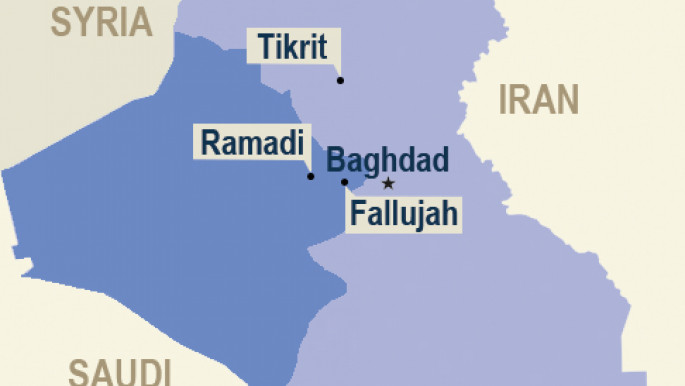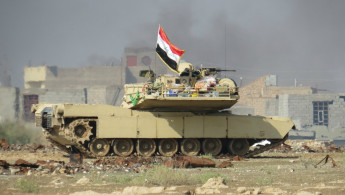Countdown to Ramadi: Huge military offensive against IS imminent
Reinforcements are on their way to Ramadi as tribal forces surround the IS-controlled city and the international coalition steps up air raids in Anbar, in preparation for a large-scale offensive.
2 min read
An Iraqi and international coalition offensive to recapture Ramadi is imminent [Anadolu]
The Iraqi Ministry of Defence (MoD) has mobilised reinforcements towards the Iraqi city of Ramadi, as the international coalition stepped up their air raids on Islamic State group (IS) positions and tribal forces surrounded the city from all directions.
All the indications point out that the countdown to a large-scale offensive to recapture Ramadi, the capital of Anbar province, has begun.
A lieutenant colonel in the Joint Operations Command (JOC) told al-Araby al-Jadeed that a plan to storm Ramadi is being studied by the Iraqi army commanders and "US experts" who are trying to determine the "zero hour for launching the offensive."
The senior officer said that the JOC commanders asked the Iraqi MoD for "new military reinforcements to support the troops that will storm the city."
The officer who preferred not to be named said that the MoD agreed to the request and sent "more than 1,000 armed and equipped fighters," noting that the "reinforcements are on their way to Ramadi," and that this "is an indications that the launch of the offensive is near."
The JOC confirmed that "coalition and Iraqi air forces carried out 78 raids on [IS] positions" in different sectors.
The JOC said in a statement for the press that "dozens of IS militants were killed in the air raids and 16 IS positions were destroyed."
The statement pointed out that information from the MoD's Information and Investigations Agency enabled the air force to target the position of an IS leader, Abou Fajr, in the Sedira area of Nineveh province, killing him along with eight other members of the group.
Anbar Provincial Council called on security forces to "open safe corridors for civilians in the city of Ramadi."
A member of the council, Ammash al-Karboli, told al-Araby that preserving the lives of civilians is an "absolute necessity in battles," and he commended the "extensive coordination with coalition air forces in preparation for the launch of the decisive battle."
Karboli underscored "the importance of opening safe corridors for families out of the city of Ramadi before storming it" and that securing an exit for them is "part of the victory that we seek to achieve."
Ramadi had seen relative calm recently and some local officials held the government - and the ruling National Alliance bloc in general - responsible for the slowdown because of statements in which they had criticised Washington and the international coalition, which they say had a negative impact on the military efforts to recapture Ramadi and eventually Anbar province.
All the indications point out that the countdown to a large-scale offensive to recapture Ramadi, the capital of Anbar province, has begun.
A lieutenant colonel in the Joint Operations Command (JOC) told al-Araby al-Jadeed that a plan to storm Ramadi is being studied by the Iraqi army commanders and "US experts" who are trying to determine the "zero hour for launching the offensive."
The senior officer said that the JOC commanders asked the Iraqi MoD for "new military reinforcements to support the troops that will storm the city."
The officer who preferred not to be named said that the MoD agreed to the request and sent "more than 1,000 armed and equipped fighters," noting that the "reinforcements are on their way to Ramadi," and that this "is an indications that the launch of the offensive is near."
The JOC confirmed that "coalition and Iraqi air forces carried out 78 raids on [IS] positions" in different sectors.
 |
The JOC said in a statement for the press that "dozens of IS militants were killed in the air raids and 16 IS positions were destroyed."
The statement pointed out that information from the MoD's Information and Investigations Agency enabled the air force to target the position of an IS leader, Abou Fajr, in the Sedira area of Nineveh province, killing him along with eight other members of the group.
Anbar Provincial Council called on security forces to "open safe corridors for civilians in the city of Ramadi."
A member of the council, Ammash al-Karboli, told al-Araby that preserving the lives of civilians is an "absolute necessity in battles," and he commended the "extensive coordination with coalition air forces in preparation for the launch of the decisive battle."
Karboli underscored "the importance of opening safe corridors for families out of the city of Ramadi before storming it" and that securing an exit for them is "part of the victory that we seek to achieve."
Ramadi had seen relative calm recently and some local officials held the government - and the ruling National Alliance bloc in general - responsible for the slowdown because of statements in which they had criticised Washington and the international coalition, which they say had a negative impact on the military efforts to recapture Ramadi and eventually Anbar province.





 Follow the Middle East's top stories in English at The New Arab on Google News
Follow the Middle East's top stories in English at The New Arab on Google News
![Israeli forces ordered bombed Gaza's Jabalia, ordering residents to leave [Getty]](/sites/default/files/styles/image_330x185/public/2176418030.jpeg?h=a5f2f23a&itok=_YGZaP1z)

